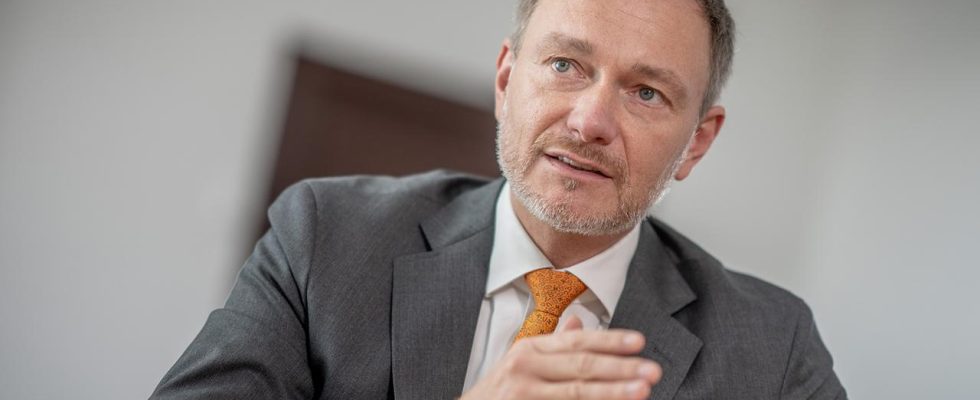Finance Minister Lindner has an idea to increase the defense budget: from 2028 there will be scope in the budget of up to nine billion euros. Lindner has disciplined budget management and the repayment of Corona debts in mind.
Federal Finance Minister Christian Lindner sees scope for up to nine billion euros in the federal budget from 2028 to increase the defense budget. With disciplined budget management, the debt ratio will then be below the 60 percent of economic output required in the EU, the FDP leader told the dpa news agency.
“If we fall below this limit, then the repayment of the Corona debt planned from 2028 could be discussed again.” The money could instead flow into the defense budget.
Emergency loans recorded
The federal government took out emergency loans worth around 300 billion euros in 2020, 2021 and 2022 due to the Corona crisis and the war in Ukraine. The repayment is actually scheduled to begin in 2028 and run for more than 30 years. Currently, debt repayment of nine billion euros is planned annually from 2028, said Lindner.
“But if the burden of the pandemic on debt has already been overcome, the repayment could be significantly reduced,” he announced. “This would provide billions of dollars that will help us reach the NATO target in the federal budget after the end of the special program for the Bundeswehr.”
Back to pre-Corona levels in 2028
Before the corona pandemic in 2019, the federal government had already achieved a debt ratio of 59 percent and had thus met the European Maastricht criteria again after a long period of time. Due to the pandemic-related loans, the rate rose rapidly to 69 percent. It is now back to around 63 percent of gross domestic product. “If we continue to pursue this line, we can actually be at the pre-Corona level as early as 2028,” said Lindner.
This year has so far been considered particularly difficult in terms of budget policy, because then the 100 billion euro special fund for the Bundeswehr could also be used up. This means that the federal government must cover defense spending entirely from the normal budget – and to such an extent that Germany meets NATO’s two percent target.
We hear from those around the Ministry of Finance that an additional 25 billion euros would have to be raised for this. Even if the federal government were to completely forego repayment of the Corona debt, there would still be a gap. In order to raise the remaining amount of around 15 billion euros, reallocation from the other budgets would be necessary.
Economic growth and no additional social spending
Lindner was nevertheless optimistic: “If we manage to strengthen our economic growth in the years up to 2028 and if we forego additional costly, legally binding social spending, then we will manage to meet the two percent target,” he said.
Lindner expressed surprise at reports that several billion euros could be missing from the two percent target again next year. At the professional and working level, no evidence was presented or known that would allow this conclusion. Lindner said: “The NATO goal in the federal budget will be achieved in all coming years.”
“Two percent goal”
The federal government has declared a military turning point in response to the Russian war of aggression against Ukraine. Russia is now again classified as a security threat and there are warnings that Kremlin ruler Vladimir Putin could also attack other European states. The declared goal of Federal Defense Minister Boris Pistorius (SPD) is to make the Bundeswehr “war-ready”.
The federal government has also promised that from now on Germany will achieve the minimum share of gross domestic product stipulated in NATO (“two percent target”) – for the first time this year. The means for this is the 100 billion euro, loan-financed special pot for the Bundeswehr, which is expected to be exhausted by 2027.
“With the help of the special fund, two percent of the gross domestic product will be made available on a multi-year average of a maximum of five years based on the current government forecast for defense spending according to NATO criteria,” says the law authorizing the loan. However, it is still unclear what will happen after 2027.
Motivation for everyone
From the FDP leader’s point of view, the prospect of financial flexibility should also be an incentive for the Greens and SPD to exercise discipline in the federal budget. “I give the figure nine billion euros of additional scope in 2028 so that we are all motivated,” said Lindner. It’s not about simply looking for a way out, but about persevering.
“Because if we now consistently continue on this path, in the federal budget and also with the special funds, then this reward awaits us. This means that we will then have solid finances, a lower interest burden and at the same time can create additional financial leeway in our repayment plans.” said Lindner.
Currently, the Finance Minister criticized, the SPD and the Greens are repeatedly questioning the Basic Law and the coalition agreement in the debate about the debt brake.
“This constant disunity is damaging to the coalition’s external image,” emphasized Lindner. He added: “My advice would be to simply accept the status quo until the federal election. Then the citizens can decide whether there should be more state, more debt and higher taxes or a lean state with fewer interest burdens and lower taxes.”
Martin Polansky, ARD Berlin, tagesschau, April 2nd, 2024 8:26 a.m

